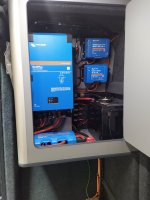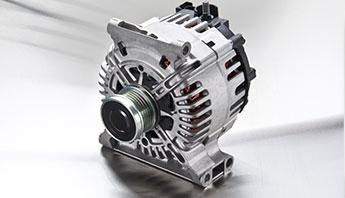Yes, it's really a VSR - It's one of these:
Find your spare parts online - We have a big selection

hc-cargo.co.uk
(and van was a self-build but not by me)
It's been installed with 16mm^2 cables so replacing it with the Vctron 30A unit ought to be fine.
Not sure why it's failed though - nor why it might click in/out with the engine off either. I had a good look yesterday with a view to removing it and making space for something else and it was working when I started the engine... (Alternator was putting out 14v) but it's done that before in the past few weeks, so maybe the contacts are sticking or something and shoogling it about helped? Who knows. I'll replace it then do a "bigclive" on it to see...
Cheers,
-GT
The HC-Cargo is one of a whole raft of VSRs that are pretty good but they certainly can fail. something that can be overlooked is the earth connection - that must be good for the relay to work.
You are in a good position to swap it for a B2B cabling-wise. If you wanted to keep to a budget but wanted a more reliable option, the
Victron Cyrix-CT could be worth considering? Described as a '
Battery Combiner' it is essentially a semi-intelligent VSR, but it comes with a 5 year warranty, which is a key thing.
I had a customer fit one and it did fail after a year or so, but my
Victron distributor just sent out a replacement with little fuss once we did some basic trouble-shooting to confirm it was the unit at fault.
A feature of the
Victron Cyrix-CT is it has a "
Battery Assist" feature. It has a connector that if you put to +12V will engage the Relay, connecting the batteries and allowing the Leisure
Battery to help start the engine. You usually conenct this to a momentary switch fitted near the driver and pressing the switch activates the relay for 30 seconds.
Admit I skim read yr post and missed the important Cargo info

.
Sounds like the voltage sensing part of the unit has gone dodgy TBF I don't really care for them and depending on the brand they cut out before the LB is fully charged (which I think the Cargo does) and can link the 2 batteries together momentarily while starting depending on
solar input at the time (which I dont think the cargo will)
Ref the VSR Operation generally and the HC Cargo model specifically, which is very typical of most of them, they have a turn-on voltage of around 13.8V, and once engaged they will stay on all the time until the voltage drops to around 12.8V. So I don't see why there should be a premature disconnection?
The majority of VSRs (and this applies to the HC Cargo as well) are bi-directional in operation and will engage if
EITHER side hits the Voltage on-threshold. And they will stay on until
BOTH sides drop below the Voltage off-threshold. So charging the Leisure
Battery on either EHU or
Solar will activate the VSR as soon as the voltage hits 13.8V, connecting the Leisure and Starter batteries together and so the Starter will get charged as well. (This is a significant benefit of a VSR over both a B2B or a switched type SCR system. The alternative is usually to fit a
Battery Maintainer/Trickle Charger like an AMT12-2 ).
There are a couple of uni-directional VSRs, and at least one VSR that as well as a certain voltage has a vibration detection so is meant to ensure it is only on when the engine is running. These are fairly rare and not actually that reliable.
Something also that people need to be aware of is you cannot use a VSR if you have Lithium Batteries. The OFF Voltage Threshold at 12.8V is too low and when connected to a Lithium
Battery will only disconnect when the
battery is pretty highly discharged. You would end up with a Relay that will turn on, but never turn off.
Victron do make a Lithium compatible version of the Cyrix
Battery Maintainer (actually 3 versions) and the
Victron Cyrit-CT Li can work pretty well as it has a higher disconnect voltage compatible with Lithium values.





